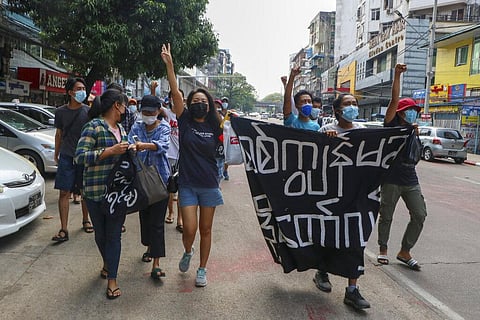

Since February 1, the attention of the world is drawn particularly to two countries, firstly to Myanmar due to the coup d’état and then to its ally China because of its close involvement in that nation through non-war military activities for a long period of time. It comes after months of increasing friction between the civilian government and the powerful military, the Tatmadaw, over alleged election irregularities. The overthrowing of the democratically elected government has led to mass protests.
China’s intentions: Beijing has been suspected as a supporter of the coup. It established diplomatic relations in 1950 and supported Myanmar through thick and thin. Since the late 1980s, China has been the major source of military equipment and training for Myanmar (then Burma). In the past, it has supported Myanmar when it was facing full-throated criticism from other countries over its treatment of the Rohingya minority in Rakhine state.
The reason for this support can be traced in a translated document of People’s Liberation Army’s (PLA) prepared in 2013 and titled ‘Science of Military Strategy’ by China Aerospace Studies Institute with the US Department of Defense. Here, we can see that China identified the growing importance of ‘non-war military activities’ (NWMA). Though intended for overseas military expansion, they are now however undertaken through increasing economic and political influence and include a number of non-war or civil activities.
China’s engagements with Myanmar have been consistent and supportive in various spheres such as politics, economy and cultural tie-ups. China has supported Myanmar from the time of the Communist Party to rule by the military and then the National League for Democracy (NLD). It is a major investor and an exporter of Myanmar’s wealth of natural resources. Through an exchange of tourists, writers, culture, art and Buddhism, China has been expanding its influence over the citizens of Myanmar.
Rationale for China’s support: Beijing had started sowing the seeds of NWMA in Myanmar since the beginning of the last decade by emerging as the largest trading partner and lender and the biggest Foreign Direct Investment (FDI) player. Chinese Foreign Minister Wang Yi and Myanmar’s Suu Kyi signed a bilateral agreement for their flagship project, the China Myanmar Economic Corridor. It stretches from China’s Yunnan province to the Bay of Bengal coast of Myanmar as a part of Beijing’s Belt and Road Initiative (BRI) . It includes 38 large infrastructure projects, out of which Myanmar has made only three public.
Since the coup, there have been concerns about the safety of the pipelines, including that of a major one from Rakhine to Yunnan. During the ongoing demonstrations, to condemn Beijing’s support to the coup, protestors are threatening to attack Chinese oil and gas pipeline projects. The people of Myanmar have mockingly called out Chinese officials on social media. Therefore, if using its economic and political influence in Myanmar, China encourages the establishment of democracy in that nation again, it can leverage its position to gain momentum for the remaining 35 infrastructure projects signed in the MoU.
China’s so-called “non-interference principle” is being highly criticised by locals in Myanmar as well as other nations as Beijing has been against passing a resolution for restoration of democracy in the UN Security Council. With the US freezing $1 billion in assets belonging to the Myanmar government and several other countries officially condemning the coup or imposing sanctions against the perpetrators, China will have to do a balancing act in order to continue with the economic activities in Myanmar carried out by them in the past decade.
Future of the ties: The Chinese ambassador to the UN has suggested that the time has come to de-escalate the crisis through dialogue and showed the nation’s readiness to engage with parties in Myanmar for the same. Chinese analysts do not agree with the accusations of their country’s support for the coup and suggest that Beijing has no intention to do so as its economic interests are at risk.
The case for Myanmar is different due to fierce social opposition. Public pressure that Beijing faced led to suspension of projects such as the Myitsone hydropower dam and the Letpadaung copper mine. Since then, Beijing has understood the need for cooperation from the local people to complete its ambitious projects. Hence, learning from past experience, China should help in resolving the coup that is against the will of the people of Myanmar. Otherwise, it should be ready to face a similar kind of social opposition to BRI projects in the future.
Having a stable democracy in Myanmar is beneficial to China than a military-backed government. The latter poses security concerns and cannot provide a conducive business environment that the NLD can. In fact, it is only going to benefit China in the long run if there are democratic and fair elections in Myanmar. Further, this is an opportunity for China to gain a diplomatic achievement in a post-Covid world.
Kunal Tilak
Founder of TTC Media Pvt Ltd
Vaibhavi Pingale
Assistant Professor of Economics, Savitribai Phule Pune University
(vaipy2702@gmail.com, kunaltilak79@gmail.com)